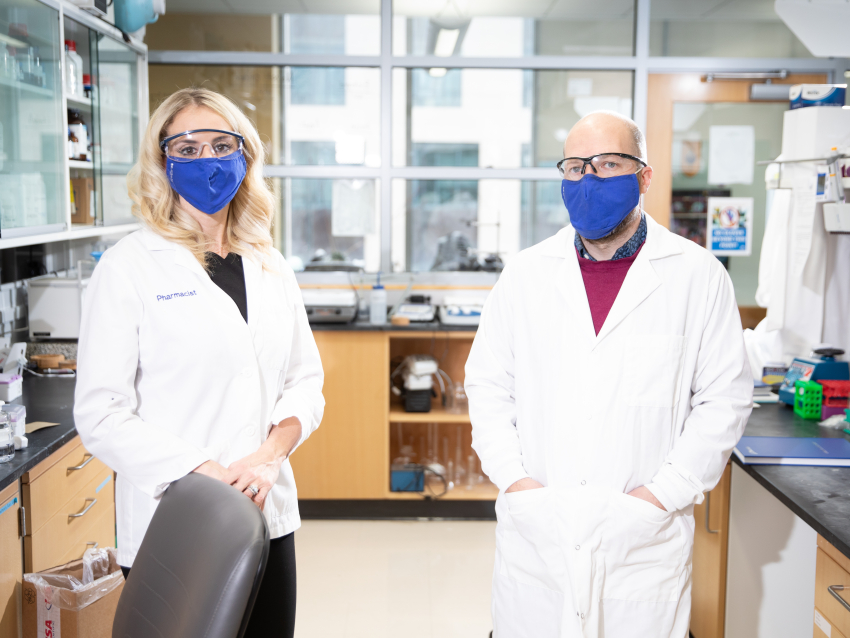
What You've Wanted to Know about COVID-19 Vaccines
We spoke with University of Kentucky College of Pharmacy professors Brooke Hudspeth, PharmD., and Vince Venditto, Ph.D., to get answers to some of your common COVID-19 vaccine questions. Hudspeth is a pharmacist and associate dean at the college and is part of the task force overseeing the rollout of the COVID-19 vaccine at UK and UK HealthCare. Venditto is an assistant professor with training in vaccine development and is working with Hudspeth and others on a clinical trial to understand the prevalence of SARS-CoV-2 in Kentucky.
1. Could the vaccine become mandatory?
VENDITTO: It is hard to imagine that vaccines will become mandatory at the federal level given the history of vaccines in the United States. However, there is precedent for institutions within the U.S., like universities or healthcare facilities, to require vaccines for employment/admission.
2. How do we know the vaccine won’t interact with medications we may be on or other vaccines?
HUDSPETH: We currently do not have data to assess the co-administration of either of the available COVID-19 vaccines with other vaccines. Therefore, it is recommended that you space other vaccines by at least 14 days in most cases. Additionally, those receiving immunosuppressant therapy, or otherwise immunocompromised, may have a diminished response to the COVID-19 vaccines. These individuals may receive the COVID-19 vaccination if there are no contraindications and should talk to their pharmacist or primary care provider about any concerns they may have. Your healthcare provider will conduct a comprehensive screening process before administering the vaccine to ensure that it is safe and appropriate.
3. Will this be like other vaccines that need to be updated every x number of years?
VENDITTO: At this point, we don’t know the answer since we don’t know with certainty how long vaccine-induced immunity will last. Right now, we just haven’t had enough time to know how long protective immune responses will persist.
4. What does your body do with the RNA after it has done its job?
VENDITTO: After immunization, the local muscle cells take the mRNA into the cells and use the mRNA to make proteins that will induce an immune response. The mRNA is eventually destroyed with no signs that it was ever-present in those cells or the arm of the vaccine recipient.
5. Will the vaccine have a negative effect on people with food allergies?
HUDSPETH: There have been a few rare cases of individuals with known allergies having severe allergic reactions to the vaccine, which is why it is important to be observed under medical supervision after receiving the vaccine. The reactions have only been observed in about 5 out of a million doses administered for the Pfizer vaccine and less than 3 out of a million doses for Moderna. The cause of this reaction is not well understood, and ongoing studies are underway to determine why allergic responses are observed in rare cases. If you have any known allergies, it is important to talk to your medical provider or pharmacist before receiving the vaccine.
6. What do I say to someone worried about the vaccine being rushed?
VENDITTO: While the vaccine was approved faster than any vaccine in history, no steps were skipped to get us to this point. Typically, there are manufacturing and patient recruitment delays, financial barriers, as well as bureaucratic delays to get a vaccine approved. This vaccine trial was completed in about one year because all of the manufacturing steps were initiated without waiting, and the U.S. government and pharmaceutical companies supported the process financially.
There were minimal delays in recruiting subjects to join the vaccine trials, and manufacturing was scaled up as soon as the process started. All steps were then completed and evaluated by advisory boards to ensure safety. It is also important to know that the technology used was designed for rapid response to pandemics and has been in development for over 20 years - this pandemic presented an opportunity to use it.
7. Are the current vaccines effective against new variants of the virus?
VENDITTO: It is very natural for viruses to mutate, and the level of mutation is important to consider for whether the vaccine will still work. Based on the available data, this virus mutates relatively slowly compared to things like flu or HIV. Because of the slow rate of mutation, minor changes are unlikely to affect vaccine efficacy. When more significant changes occur, it is possible that we will need a new vaccine. The National Institutes of Health (NIH) and vaccine manufacturers continue to monitor if the vaccines work with every new variant that arises.
8. If the vaccine works, why do we still have to wear masks?
HUDSPETH: The vaccines were tested for their ability to prevent severe disease. We know from the clinical trials that people who were vaccinated had less severe disease and were less likely to be hospitalized. It is still possible for vaccinated people to be infected and transmit the virus to others. This is why it is important to continue wearing your mask, physical distancing, washing your hands. The vaccine will keep you out of the hospital, and your mask will help keep your family, friends, and the community safe.
9. Knowing what you do, would you get the vaccine?
VENDITTO: Yes, and I received the Pfizer vaccine due to availability when I was called to receive it.
HUDSPETH: As a healthcare professional administering vaccines to individuals in the community, I felt it was important for me to lead by example and get the vaccine when it was offered to me.
